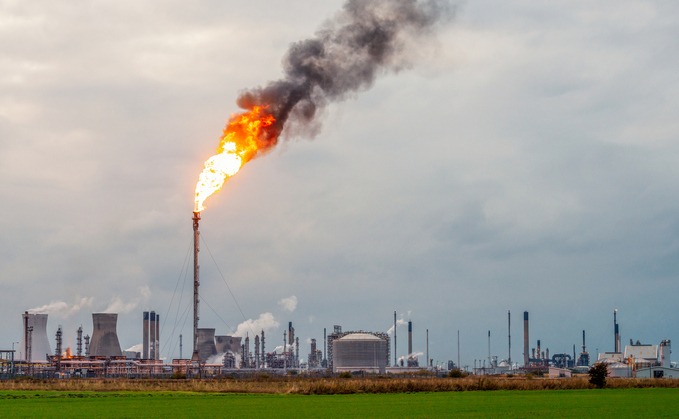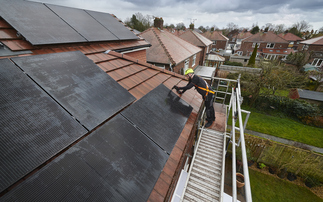Credit: iStock
SNP pledges to put green industries at heart of economic plans, but campaigners lament 'disappointing' stance on new North Sea oil and gas licenses
The SNP has today become the latest major party to publish its manifesto, promising to boost green investment in support of a "fair and managed transition to net zero" that aims to "tackle the twin crises of cost of living and climate change".
The 32-page document underscores the SNP's support for full independence and makes the case for the greater devolution of powers on multiple fronts to provide the Holyrood government with the ability to develop policies that are better tailored to Scotland's needs.
It also seeks to draw clear dividing lines with both the Conservatives and Labour, as it proposes a series of new policies designed to boost green investment in Scottish industries.
Launching the manifesto this morning, SNP Leader John Swinney said the manifesto was centred on the case for independence and the SNP's position as "the only major party arguing for an end to the spending cuts".
Promising to deliver "investment not cuts", Swinney highlighted Scotland's position at "the forefront of the industries of the future such as offshore wind power". But he argued that "most economic powers lie with Westminster - and the UK economy is failing far too many people".
As such, the manifesto calls for the devolution of a raft of powers and budgets.
Specifically, it calls for Westminster to reverse the £1.3bn cut to Scotland's capital budget, "to enable us to invest in new hospitals, schools, rail and road infrastructure and help to achieve net zero". And it demands the devolution of new borrowing powers to enable increased investment in a just transition for carbon intensive industries, while calling on the new UK government to match the Scottish government's £500m Just Transition Fund for the North East and Moray region.
It also calls for the devolution of windfall taxation on the oil and gas industry to provide funding "to tackle the twin crises of cost of living and climate change while meeting the specific needs of Scotland".
"We believe it is only right that companies making excess profits shoulder the burden that families face, but that this must be a wider tax - balanced across companies - rather than the raid on the North-East of Scotland proposed by Labour and the Tories," the manifesto states.
In addition, the document calls for the devolution of road tax and fuel duty to allow the Scottish government to "develop a new approach to funding road travel that meets Scotland's needs", and the devolution of VAT rates to allow lower VAT on building refurbishment and retrofitting projects and the removal of VAT for on-street electric vehicle charging.
The manifesto also calls for new statutory social tariffs for energy, broadband, and mobile charges, and reforms to the Warm Home Discount and Energy Company Obligation scheme to create a single fuel poverty scheme for Scotland.
A lengthy section on energy and climate policy features a raft of proposals to accelerate Scotland's decarbonisation efforts, after the Edinburgh government was recently forced to drop emissions targets for 2030 having concluded it could not meet its near-term goals.
The new proposals include greater devolution of the planning system to allow increased benefits for communities that host clean energy infrastructure; the fast-tracking of the Acorn Project and Scottish Cluster carbon capture projects; reforms to the Contract for Difference regime to enable faster renewables development; a ban on new coal projects; increased funding for peatland restoration and tree-planting; and the formation of a Four Nations Climate Response Group to "agree climate plans across the UK that deliver on our net zero targets and ensure the UK government stops backtracking on climate ambition".
The manifesto also calls for the UK government to invest at least £28bn a year in the green economy and take direct equity stakes in new green energy projects, effectively calling on Labour to reinstate spending plans that it dropped earlier this year after concluding they would breach the Party's fiscal rules.
In addition, the SNP is proposing a moratorium on new nuclear projects in Scotland, stating that the it believes "the best pathway to net zero and secure, affordable and clean energy is through significant growth in renewables, storage, hydrogen and carbon capture".
On transport, the manifesto proposes a ban on the import and sale of new non-zero emission buses from 2025 and strengthened incentives for cleaner vehicles, including proposals for a new Low Income Electric Vehicle (EV) Car Leasing Fund, backed by at least £500m, to enable 50,000 EV leases a year for low income families.
Arguably the most controversial part of the SNP's green plans see it draw a clear dividing line with Labour by keeping the door open for new oil and gas drilling licenses.
"Our commitment to tackling the twin crises of climate change and nature loss is unwavering and we believe emissions reduction and economic prosperity go hand in hand," the manifesto states. "We want to share in the enormous economic opportunities of the global transition to net zero."
But it also argues the government should "take an evidence-based approach to oil and gas". "The UK government is the decision-maker on new oil and gas licences," it states. "We believe any further extraction must be consistent with our climate obligations and take due account of energy security considerations. Decisions must be made on a rigorously evidence-led, case-by-case basis, through a robust climate compatibility assessment."
However, it provides no further details on how new licenses should be assessed as being in line with climate goals.
Tessa Khan, executive director at campaign group Uplift, said the SNP's stance on oil and gas was "confused and disappointing". "Given that the world's experts have said there can be no new oil and gas fields if we're to have a hope of staying within safe climate limits, there is no such thing as a 'climate compatible' new oil field," she said. "The SNP should listen to its voter base - less than one third of whom support new licensing in the North Sea - instead of the oil and gas giants who want to keep making as much as they can for as long as they can.
"The reality is that the North Sea is already in decline, with jobs halving over the past decade, despite hundreds of licences being issued in this period. What workers urgently need is a credible transition plan that ensures Scotland's workers and communities benefit from the transition to clean energy. New licensing is a pipe dream that will do nothing to protect jobs or boost energy security."
She added that the SNP's call for a social tariff on energy bills for people on low incomes was very welcome, but was also a tacit admission of how households had been impacted by the spike in fossil gas prices. "Politicians should be doing everything possible to get us off gas - by insulating homes and accelerating the shift to homegrown renewables - not locking us into an expensive energy supply for decades longer than necessary," she said.
Keep up to date with all the latest green business news by signing up to the free Daily and Weekly BusinessGreen Newsletters.











